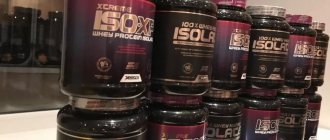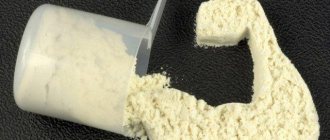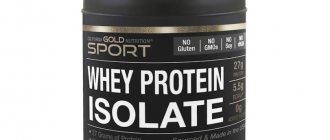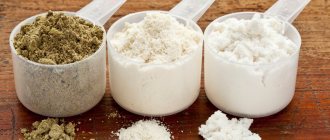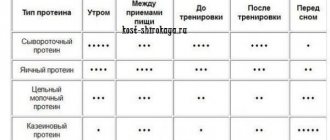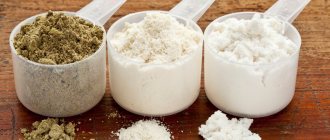2020-10-09 19:36:37 0 2071
Whey protein concentrate and isolate are the undisputed kings of protein sources, and each has its pros and cons depending on your goals. So which is best for you?
When it comes to concentrate and isolate, they have two main differences, although both are derived from the same product: milk.
Both of these proteins are obtained by filtration, but the isolate undergoes more intensive purification. Therefore, isolate has fewer calories, carbohydrates and fats than concentrate, but it also contains more protein.
It also contains less lactose, making it preferred by people trying to avoid dairy products. However, this does not mean that concentrate is not suitable for you. Whey protein concentrate is also low in fat, carbohydrates and calories, yet contains pure protein and is usually less expensive.
In this article, we'll look at the properties of these two protein sources so you can make an informed decision about which one is best for you.
What is whey protein concentrate?
Whey protein is obtained from milk. Once separated, it undergoes microfiltration rather than heating. It can provide your muscles with ultra-pure, ultra-refined and powerful protein. Whey protein concentrate is considered the most popular, most effective and cost-effective protein on the market.
The reason whey protein concentrate is microfiltered rather than heated is to ensure that its amino acid profile remains as pure and strong as possible. This also means that when mixed with water or milk, it retains its silky smooth texture. Although only shakes with high-quality whey protein concentrate will have this texture.
Nutritional Information of Whey Protein Concentrate
When whey is removed from milk and microfiltered, it retains a very high percentage of protein, and depending on what protein concentrate you buy, the percentage can range from 30% to 80%. However, it contains very little carbohydrates and fat.
Benefits of Whey Protein Concentrate
You probably already know about the benefits of protein, such as improving muscle growth, speeding up muscle recovery, and reducing recovery time, which is especially important if you're an avid gym-goer. But its nutritional value and low fat and carbohydrate content make it ideal for anyone on a diet or looking to build muscle without adding extra calories. Thus, you can enjoy this high-protein product without harming your figure. Whey protein concentrate is easily and quickly absorbed by the body and contains all nine essential amino acids.
Whey Protein and Its Benefits
Whey is one of the two main components of milk, the liquid portion that is separated from the curds (the other main component) during the cheese making process. Whey contains proteins, fats, carbohydrates, vitamins and minerals. Whey protein is produced on its basis.
Due to its complete amino acid profile and rapid absorption, whey protein is arguably the most popular sports nutrition product.
Whey protein has been shown to increase muscle protein synthesis, support fat burning, boost immunity, improve insulin sensitivity, and reduce appetite.
Additionally, it increases the production of glutathione, a major antioxidant in the body.
What is whey protein isolate?
Whey protein isolate is often overlooked. But don't underestimate it, because isolate contains a huge amount of protein, even more than concentrate. As we said, whey protein concentrate contains about 80% protein, while whey protein isolate contains about 90%.
Simply because of the way isolate is processed, it contains extremely little fat. Whey protein isolate undergoes a process called “cross-microfiltration” to separate the protein from fat, cholesterol and lactose, resulting in an ultra-pure final product. This means that whey protein isolate contains much less fat, cholesterol, carbohydrates, lactose and calories than any other protein shake on the market. Although it is not 100% lactose-free, there is very little of it, so isolate is often recommended for athletes who do not want to consume dairy products.
Nutrition Facts of Whey Protein Isolate
Like whey protein concentrate, whey protein isolate is extremely low in fat. Isolates are available on the market with different percentages of protein. And because the isolate is intensely purified, it is very easily digested and absorbed.
Benefits of Whey Protein Isolate
Isolate is ideal for anyone who is dieting or watching their carbohydrate, calorie and fat intake while also wanting to consume enough protein. This extremely low-carb product means your body can quickly and easily absorb protein and send it straight to where you need it most. The high protein content helps muscles grow and repair so they are ready for the next intense workout.
Types and differences of whey proteins
There are several types of whey protein: concentrate, isolate and hydrolysate.
They differ in the content of protein, carbohydrates (lactose), biologically active substances, protein form, etc.
These differences are a consequence of different degrees of technological processing of the raw material - milk whey.
Whey is a by-product of the cheese and yogurt making process. It makes up 80-90% of milk volume and contains about 50% of milk's nutrients: protein, lactose, vitamins and minerals.
The protein content of whey is low, so the process of making whey protein begins with its concentration.
Whey must be processed immediately after it is separated during cheese making, as bacteria begin to multiply very quickly in it, destroying protein and producing lactic acid, increasing its concentration 1.
We recommend : Is it possible to eat eggs while losing weight? Which is better: raw, boiled or fried?
1 Whey Protein Concentrate
Whey contains a large amount of water, which, when removed, produces whey concentrate, which has a much higher protein content.
As for other nutrients (fats and carbohydrates (lactose)), their amounts can vary significantly in different types of concentrate (see table below).
Processing occurs at low temperature and low acidity, which helps preserve the biological value of 90-96% of the original protein .
Those. the degree of damage to the protein is very low and almost all of it, when consumed, will be used for its intended purpose and will not be flushed down the toilet.
Please note: the paragraph above does NOT indicate the amount of protein, but its biological value, i.e. how completely it is absorbed. 100% corresponds to complete absorption.
Whey protein concentrate can be obtained even at home by simply evaporating the whey at a low temperature and then drying the dehydrated whey mass. True, the fat and carbohydrate content in it will be higher, and the protein content will be low.
Depending on the degree of concentration, the amount of protein in the concentrate can vary from 35% to 80% of the weight of 1.
Content of other nutrients per 100 g of product (for concentrate with 80% protein, which is most often used in sports nutrition):
- ~4 g fat;
- ~3 g of carbohydrates (the proportion of carbohydrates varies from manufacturer to manufacturer);
- 6-7 g lactose (as opposed to 1 g in whey protein isolate).
If a technology without strong heating is used in production, the concentrate retains beneficial biologically active substances - the same ones that are responsible for the health benefits of whey protein.
For those who are lactose intolerant, it is important to keep in mind that the lactose content in whey protein concentrate can be up to 7%, i.e. its consumption by such people (like whole milk) can cause gastrointestinal disorders.
Whey protein isolate does not have this problem because its lactose content is kept to a minimum.
Share with us your experience of losing weight or gaining muscle mass!
Whey protein concentrate is the cheapest form of this protein, since, unlike isolate and hydrolyzate, it requires fewer production resources during production.
| Differences between different types of whey protein concentrates 1 | ||||
| Type of whey protein concentrate | 35% protein | 50% protein | 65% protein | 80% protein |
| Protein, % | 29.7* | 40.9* | 59.4* | 75.0* |
| Moisture, % | 3.8 | 3.8 | 3.8 | 3.8 |
| Lactose, % | 46.5 | 30.9 | 21.1 | 3.5 |
| Fat, % | 2.1 | 3.7 | 5.6 | 7.2 |
| Lactic acid, % | 2.8 | 2.6 | 2.2 | 1.2 |
*The difference in the mass fraction of protein in the name of whey protein concentrate and in the composition is explained by the fact that the name reflects the value calculated based on the total nitrogen content in the product (protein): not all the nitrogen in its composition is part of the protein molecules.
The main difference between whey protein concentrate compared to isolate and hydrolyzate is a smaller amount of protein, lower price and preservation of biologically active substances beneficial to health.
We recommend : Casein or Cottage Cheese? When is the best time to eat cottage cheese for weight loss and muscle gain? Is it possible for the night?
2 Whey protein isolate: differences from concentrate
Whey protein isolate has gained particular popularity in bodybuilding due to its high concentration of protein and low concentration of fats and carbohydrates, which are considered undesirable.
Whey protein isolate has a significantly higher protein concentration of all types of whey proteins - over 90%.
The content of lactose, fat (0.4% compared to 7% in concentrate) and cholesterol is significantly lower than in concentrate.
There are two technologies for producing whey protein isolate: ultrafiltration and ion exchange.
Both produce a powder with very good consumer qualities: solubility, foaming, formation of emulsions and gels, and are pleasant to the taste.
However, in terms of beneficial properties, the isolates obtained using these two technologies differ.
Using ultrafiltration technology, in which the whey is not heated or chemically treated, the isolate retains important bioactive components that enhance immune function and provide other health benefits.
Ion exchange technology, on the contrary, destroys almost completely biologically active fractions .
Also, a large proportion of the protein becomes unusable , which reduces its effectiveness for gaining mass.
Isolate has a significantly higher concentration of BCAA amino acids compared to concentrate. These amino acids play a critical role in creating muscle fibers, restoring them after exercise, and protecting them from breakdown.
If you think what we do is important, support our project!
YES!
The rate of digestion and absorption of whey protein isolate is the same as that of concentrate.
Whey protein isolate, in contrast to concentrate, has a significantly higher protein content, less lactose, fewer biologically active substances, and in some of its varieties, a higher relative proportion of damaged protein. It also costs more
We recommend : The benefits and harms of milk: expert reviews
3 Distinctive properties of whey protein hydrolyzate
The protein molecules in whey protein hydrolyzate are pre-broken into chains of several amino acids, eliminating the need for digestion. Therefore, its absorption rate is even higher than that of concentrate and isolate .
It is often recommended for use immediately AFTER and DURING bodybuilding training - when the body's need for nutrients is maximum.
Scientific research supports the superior muscle-building benefits of whey protein hydrolyzate when taken during and after exercise.
This is explained primarily by the faster absorption time and greater availability of amino acids when taken immediately after training.
Hydrolysates are less allergenic compared to non-hydrolyzed types of milk proteins.
One of the disadvantages of hydrolyzed whey protein is the lack of a thermic effect : it requires significantly less energy to digest.
This is one of the properties that makes protein and protein foods in general beneficial for weight loss. Therefore, whey protein hydrolyzate is less beneficial for weight loss than concentrate and isolate.
Also, during hydrolysis due to exposure to high temperature, beneficial protein fractions - biologically active substances - are destroyed.
This type of protein is most often the basis for making protein bars.
Isolates, hydrolysates and other purified forms of proteins tend to be more expensive than concentrates because the technology for making them is more complex.
Whey protein hydrolyzate has the highest absorption rate (~20 min), is less useful for weight loss, contains fewer biologically active substances, and the protein in its composition is often highly damaged
We recommend : Protein bars: benefits and harm. Reviews from doctors and scientists
Whey Protein Concentrate or Isolate: Which One Should You Take?
Both whey protein concentrate and isolate are very high in protein, but the difference lies in the carbohydrate and fat content. If you're watching your calorie intake and want to lose weight, isolate is a better choice, but if you're looking to build muscle, we recommend whey protein concentrate. Another thing worth noting is the price. Because whey protein isolate undergoes longer processing, it tends to be more expensive and contains less lactose. But overall, these are really great products and each has its own benefits.
Protein selection based on desired results
If you can't decide which type of whey protein is best for you, look at the table and choose it based on the goal you want to achieve.
| Target | Whey Concentrate (WPC) | Whey Isolate (WPI) | Hydrolyzed whey protein (WPH) |
| Gain muscle mass | * | * | |
| Get rid of fat | * | ||
| Lactose intolerance | * | * | |
| Quickly absorbed | * |
Operating principle
Proteins are an important building material for the entire human body.
Taking protein supplements replenishes the required amount of proteins and helps the body function normally.
After protein enters the body, it breaks down into amino acids. It is these amino acids that are the substances that form muscle tissue, ligaments or joints.
The development of the body requires a large amount of amino acids in the form of polypeptides. The human body synthesizes some amino acids on its own, but the rest must be obtained from food.
Taking protein supplements replenishes the required amount of proteins and helps the body function normally.
In addition, due to the additional amount of protein consumed, muscle mass increases, which is primarily needed by athletes.
When losing weight, isolate helps to quickly saturate the body and reduce the amount of calories consumed by reducing fats and carbohydrates in the diet.
At the same time, to break down proteins, the body spends a lot of energy, which it takes from fat reserves.
Be sure to read: What pills will help you gain weight quickly: pharmacy, safe drugs, supplements
How do different proteins differ from each other?
Protein concentrate is the first stage of protein, which is obtained from whey after specialized processing. This format of the protein mixture contains lactose, which may have a negative impact on people who are naturally intolerant. However, in addition to this, the concentrate contains a large amount of additional nutrients necessary for the body, as well as a certain amount of calories. This makes the presented composition more versatile and gives a large number of positive effects.
As for isolate, this is a type of protein obtained through additional processing of the concentrate. In its composition, the percentage of protein is much higher, and it itself is decomposed into shorter chains, which significantly speeds up the process of its absorption in the body. At the same time, lactose, as well as many other microelements, are removed from the composition. Therefore, when taking isolate, you should structure your diet in such a way as to supplement it from other foods. The use of this type of protein will effectively fill the window in protein intake after the training process. In addition, it is well suited for those who monitor the low calorie content in their diet, since they are completely removed from the composition.
Process for obtaining isolate
Preparing isolate is a rather complex technological process that is unlikely to be repeated at home. The main principle of constructing an isolate is a high level of purification of the protein mixture from various impurities. First of all, lactose is removed from the composition, as well as various components of whey or other starting material, which may contain calories. As a rule, the final protein concentration in the isolate is eighty percent or more.
To obtain the desired result, I use complex chemical and physical processes. In particular, ion exchange technology is used to remove impurities, as a result of which the protein concentration can reach its maximum level. After this, for faster absorption, the protein chains are divided into shorter fragments through hydrolysis.
Advantages of isolate and its disadvantages
BSN Syntha-6 Isolate
The main advantage of this supplement is the active saturation of muscle tissue with important amino structures for regeneration and anabolism . For the post-workout period, this drug is simply irreplaceable, as it quickly replenishes the supply of polypeptides and accelerates metabolic processes. The isolate’s arsenal also has undeniable advantages:
- pure formula with min calories
- the amount of lactose, fats and carbohydrates in the composition is reduced to zero
- amino acid content
- purified high quality protein content up to 98%
The supplement has only one drawback - high price . However, it quickly pays off with amazing results in the gym and powerful growth in muscles and strength.
If you find an error, please select a piece of text and press Ctrl+Enter.
